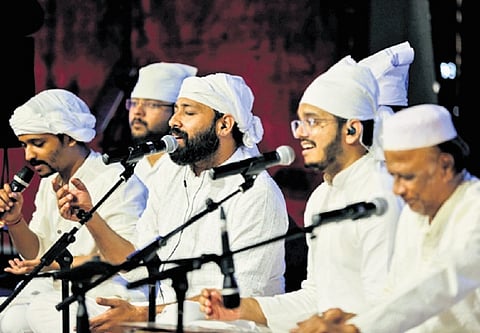

BENGALURU: In a world that often feels fragmented, art serves as a bridge to something greater – a higher power of sorts. Few art forms encapsulate this transcendence better than Sufi music. Bengaluru witnessed this ethereal connection as the KM Sufi Ensemble, part of maestro AR Rahman’s prestigious KM Music Conservatory, enthralled the audience with the Kun Faya Kun Concert, bringing the 700-year-old Sufi musical tradition of qawwali to the stage recently.
“Sufi music is powerful and moving with its universal themes of love, devotion and self-discovery. We wanted to share this transformative experience with audiences, transcending cultural boundaries,” shares Jyoti Nair, Head of Preparatory Programmes at the KM Music Conservatory.
Marking the ensemble’s debut performance in Bengaluru, the concert was presented by the Indian Music Experience Museum (IME) in collaboration with the Prestige Centre for Performing Arts. The KM Sufi Ensemble was born out of Rahman’s deep love for Sufi music and its message of harmony and brotherhood.
Nair explains, “Our journey began with an exploration of India’s vast musical heritage, inspired by legends like Ustad Nusrat Fateh Ali Khan. Guided by our mentors, we’ve delved into the ethics, aesthetics, and philosophy of Sufi music. Each performance is a labour of love and devotion, aiming to invoke unity, compassion, and inner peace.”
The ensemble, comprising 16 musicians, blends traditional qawwali pieces with contemporary elements, creating a profound connection between heritage and innovation. “To remain authentic, we engage with traditional Sufi scholars and texts. However, by using harmonies which are essentially part of the Western music tradition, we also incorporate contemporary elements, balancing innovation with respect for tradition. Our approach ensures that the essence of Sufi music remains intact while appealing to modern audiences,” says Nair.
Audiences were immersed in renditions of timeless compositions like Kun Faya Kun which was picturised in Imtiaz Ali’s Rockstar, alongside iconic traditional qawwalis such as Man Kunto Maula and Dum Mast Qalandar. Among the many highlights of the evening were Khwaja Mere Khwaja which was dediacted to the revered Sufi saint Hazrat Khwaja Moinuddin Chishti of Ajmer Sharif, and was later immortalised in Jodhaa Akbar by Rahman’s composition.
“Featuring unique instrumental arrangements, vocal harmonies and storytelling, the performance is meant to take the audience to the realm of complete ecstasy, sublimity, peace within and without, along with an increased self-awareness – all ingredients of Sufism,” she highlights.
What sets Sufi music apart is its ability to transcend cultural and linguistic barriers. Its themes of spiritual longing resonate universally, offering listeners a sense of connection and unity. “We hope the audience experiences a sense of connection and unity through our music while resonating with our message of love, compassion, and forgiveness,” shares Nair.